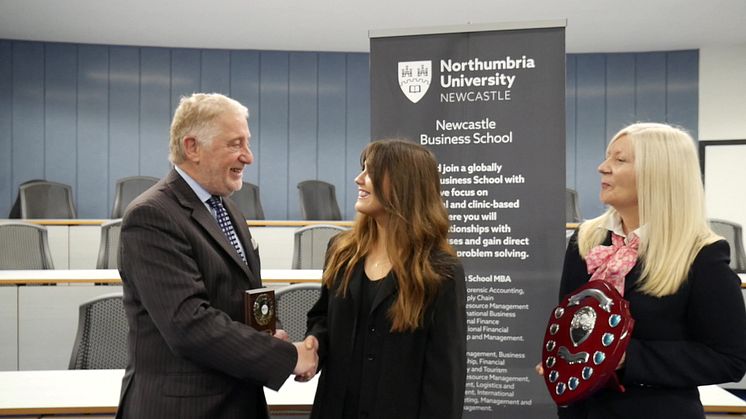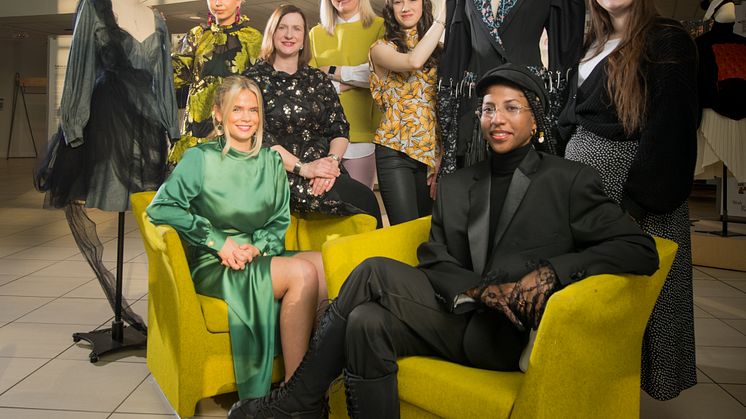
Press release -
Award-winning dissertation explores the dirty secret of fast fashion
Northumbria University business student Jane Reynolds has won a Best Dissertation in Business Ethics prize for her work highlighting a disconnect between sustainable consumerism and the growth of fast fashion.
The award was set up by the North East Initiative on Business Ethics (NIBE) and Northumbria’s Newcastle Business School to recognise the contribution students can make to promoting ethical business practice. Jane’s dissertation focused on the rise in the consumption of fast fashion – trendy but affordable clothing - amongst the so-called internet-savvy Generation Z who are in their teens and early twenties and are said to have strong sustainability attitudes. However, her research found these green credentials are not being matched with pro-environmental behaviours in terms of fashion consumption. In her dissertation Jane explored the challenges of making the fashion industry more environmentally friendly and discovered wider structural barriers to young consumers and their purchasing behaviours.
Explaining her work Jane said: “I chose this theme knowing that textile production contributes more to climate change than international aviation and shipping combined, and that the fast fashion industry has a particularly negative impact on the environment. But it is also evident that tackling the issue is not as simple as telling a fashion-conscious consumer to change their shopping habits. There are wider, deeper issues behind the purchase of fast fashion, including economic and social constraints in our society today, so there needs to be an understanding that we cannot just blame the consumer. Instead, more needs to be done to help consumers understand their own shopping habits and where they can try and make the changes to greener fashion.”
Jane’s dissertation also highlighted the issue of business ethics within the fashion industry. She added: “Multinationals have seen the profit potential in fast fashion, and have exploited it, leaving little room for environmentally friendly fashion at affordable prices. I wanted to show how business ethics within the fashion industry has a large impact on whether or not consumers are able to match pro-environmental attitudes with behaviours – and what can be done to help where they can’t. Overall, my research highlighted the need for structural change and an increase in ethical business practices.
“Winning this award means I have been given chance to share the results of my dissertation with others who are interested in ethical business practices, and ultimately to help create a more sustainable fashion industry. It is something I am very proud of.”
The selection of the winning dissertation was made by three directors of NIBE. Barry Speker OBE DL, an Employment Judge and retired solicitor explained why Jane’s submission was picked for the prize: “We considered the five dissertations short-listed. All were very well researched and looked at current issues from an ethical standpoint. Jane’s study impressed us as being innovative and very intelligently argued and we all agreed that Jane should receive the award. She identified the conflict on students from the attraction to fast fashion due to limited budgets, peer pressure, self-image and influencers. Against this was the ethical move to favour the purchase of sustainable clothing on ecological and environmental grounds.
“There was also a very perceptible section on the gentrification of second-hand clothing. The paper thoroughly addressed a real-life issue and its ethical context. Jane can be highly commended on an excellent and valuable piece of work”.
Newcastle Business School has worked in partnership with NIBE for a number of years, collaborating on responsible business seminars and exploring how the North East can remain an open, tolerant and compassionate while still competing in an increasingly global economy.
NIBE was established in 2013 by working professionals operating as challengers for good business ethics. It works through face-to-face meetings and seminars advising companies how to develop ethical practices and the benefits these can offer.
For more information on how your business could benefit from working with Northumbria please see www.northumbria.ac.uk and for information on NIBE visit: www.nibe.org.uk
Topics
Northumbria is a research-rich, business-focused, professional university with a global reputation for academic excellence. Find out more about us at www.northumbria.ac.uk --- Please contact our Media and Communications team at media.communications@northumbria.ac.uk with any media enquiries or interview requests ---









